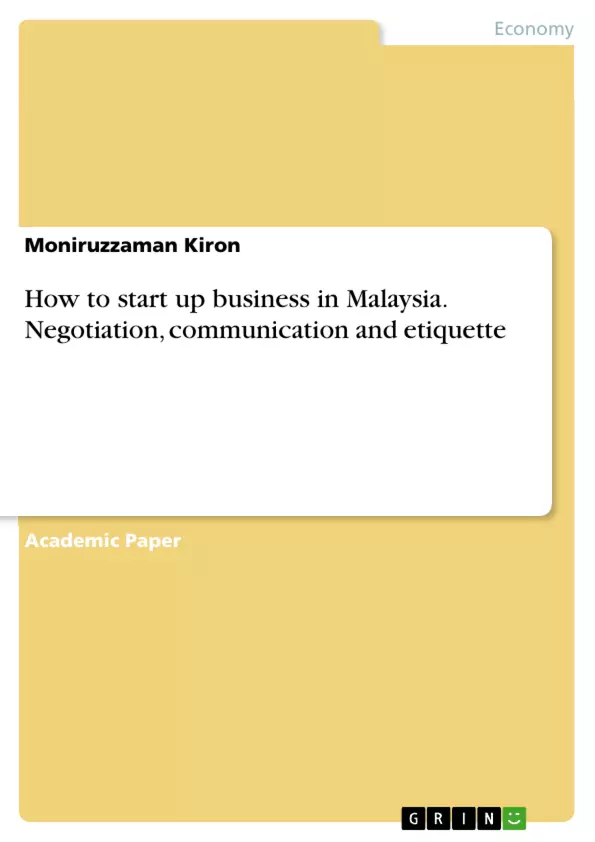This paper is about how to start up business in Malaysia. It discusses why it is important to be knowledgeable about the way people communicate in a business context. How the protocols are applied differently to Malay, Chinese and Indian such as the way each race should be greeted and addressed. Furthermore, this study also discusses why it is also crucial for foreign businessmen to be knowledgeable of the culture and the way Malaysians communicate with each other. Which definitely will assist them to prevent any failures in businesses.
Malaysia is situated in Southeast Asia which is one of the best countries in the world for foreigners to invest or set up a new business. As a foreigner who is planning to start or extend business in Malaysia, a few things need to take into account before you move forward. As Malaysia is a multicultural country where the different ethnic group has different types of norms, beliefs, customs, and culture which must not be hurt by any means. Malaysia is an emerging and diversified economic country. In 1990s, the economy of Malaysia leaps and bounds. Malaysia has become a prominent and diversified emerging industrial country in Asia and the world's emerging market economies. Tourism is the third largest source of foreign exchange earnings in Malaysia, knowledge economy services are also expand at the same time.
Inhaltsverzeichnis (Table of Contents)
- 1.0 Location
- 1.1 History
- 1.2 Economic
- 1.3 Structure
- 1.4 Language
- 1.5 Culture
- 2.0 Business Etiquette
- 2.1 Business Meetings and Greetings
- 2.1.1 Meetings
- 2.1.2 Greetings
- 2.1.3 Names and Titles
- 2.2 Gift Giving
- 2.3 Business Card
- 2.4 Dress etiquette
- 2.1 Business Meetings and Greetings
- 3.0 Decision Making
- 4.0 Negotiation Style
- 4.1 Negotiation Style in Malaysia
- 4.2 Business Negotiation Language
- 4.3 Negotiation Time
- 4.4 Negotiation Etiquette
- 5.0 Communication Style
- 5.1 Conducting Business
- 5.2 High Context Culture / Non-verbal Communication
- 5.3 Concept of Face
- 6.0
- 7.0 Conclusion
Zielsetzung und Themenschwerpunkte (Objectives and Key Themes)
This text aims to provide an in-depth understanding of Malaysian business culture and etiquette, focusing on key aspects that are crucial for successful interactions with Malaysian counterparts. The text analyzes various facets of Malaysian business practices, from the historical background and economic landscape to the intricacies of communication, negotiation, and decision-making processes.
- Understanding the nuances of Malaysian business culture and etiquette.
- Navigating the diverse cultural landscape of Malaysia, including its ethnic composition and religious practices.
- Gaining insights into communication styles and non-verbal cues prevalent in Malaysian business settings.
- Exploring the dynamics of negotiation and decision-making processes in the Malaysian context.
- Developing a comprehensive understanding of the cultural factors that influence business interactions in Malaysia.
Zusammenfassung der Kapitel (Chapter Summaries)
The first chapter provides an overview of Malaysia's geographical location, historical background, economic development, and cultural diversity. It highlights Malaysia's strategic position in Southeast Asia, its transition from British colonial rule to independence, and the significant role of tourism and knowledge economy services in its economic growth. It further explores the multi-ethnic and multi-cultural nature of Malaysian society, emphasizing the influence of Islam and other religions on social customs.
Chapter two delves into the essential aspects of business etiquette in Malaysia, emphasizing the importance of respecting cultural norms in professional settings. It provides guidance on proper greetings and meeting protocols, considering the diverse ethnicities and cultural practices of the Malaysian population. The chapter also covers the significance of gift giving, business card exchange, and appropriate dress codes in Malaysian business culture.
Chapter three examines the decision-making process in Malaysia, highlighting the need for building trust and familiarity before reaching any conclusions. It emphasizes the importance of respecting hierarchical structures and power dynamics in business relationships, particularly in the context of decision-making.
Chapter four focuses on the nuances of negotiation style in Malaysia, exploring the different approaches and communication patterns prevalent in business negotiations. It delves into the significance of nonverbal communication, the concept of "face," and the cultural considerations that influence negotiation strategies in Malaysia.
Chapter five sheds light on the communication style in Malaysian business settings, highlighting the importance of understanding the high-context nature of Malaysian culture. It explores the role of non-verbal communication, the concept of "face," and the cultural implications of direct and indirect communication in business interactions.
Schlüsselwörter (Keywords)
The text focuses on key concepts like business etiquette, cultural diversity, negotiation style, communication styles, and the importance of understanding cultural nuances in international business contexts. It highlights key themes such as respect for cultural norms, power dynamics, non-verbal communication, and the significance of "face" in Malaysian business interactions.
Frequently Asked Questions
Why is Malaysia considered a good place for foreign investment?
Malaysia is an emerging, diversified industrial country with a strong economy, a strategic location in Southeast Asia, and a growing knowledge economy.
How should I greet business partners in Malaysia?
Greetings vary by ethnic group (Malay, Chinese, Indian). It is crucial to understand specific protocols, such as how to address titles and the appropriate non-verbal cues for each race.
What is the "Concept of Face" in Malaysian business?
"Face" refers to a person's dignity and social standing. In business, it is vital to avoid causing someone to "lose face" through public criticism or direct confrontation.
What is the typical negotiation style in Malaysia?
Negotiations in Malaysia often require time to build trust and familiarity. The culture is high-context, meaning non-verbal communication and indirectness are common.
Are there specific rules for gift-giving and business cards?
Yes, the exchange of business cards and gifts follows specific etiquette that respects the multicultural norms and religious beliefs of the country.
- Citation du texte
- Moniruzzaman Kiron (Auteur), 2019, How to start up business in Malaysia. Negotiation, communication and etiquette, Munich, GRIN Verlag, https://www.grin.com/document/505855



